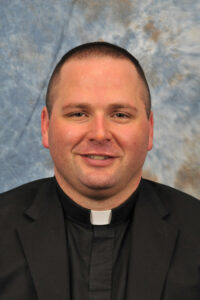(Editor’s note: This column by Father Jake Greiner was addressed to readers of the Knoxville Journal Express.)
Forgiveness is one of the most important topics that every person will have to face in his/her life. The questions around the topic of forgiveness can be summed up fairly well in the following two questions: 1.) Am I forgiven for my sins? 2.) How can I forgive others for their sins toward me and others?

Christians have different answers for the first question in light of the life, death and resurrection of Jesus Christ, so I will leave this question to your respective minister to address. However, I want to address the second question about how we can forgive others. We live in a polarized society that seems always ready to judge, condemn and isolate. The only true antidote to polarization is the willingness to forgive.
First and foremost, we must strive to forgive others. Sacred Scripture makes this abundantly clear: “Then Peter approaching asked Jesus, ‘Lord, if my brother sins against me, how often must I forgive him? As many as seven times?’ Jesus answered, ‘I say to you, not seven times but seventy times seven’” (Mt. 18:21-22). This statement by Jesus does not mean that we have a half-hearted “let’s get this situation over” attempt at forgiveness with others. We have to be constantly committed to the process, even if it takes over a hundred times. We are challenged by Jesus to reestablish the relationship that existed before the sin and, when possible, the relationship should grow stronger as a result of the sin. Why? The resentment, pain, sadness, hatred and other associated emotions that come about because of broken relationships destroy people’s lives. Jesus is challenging each of us to look to his life and imitate his desire to love people, even those who wanted to kill him.
Two important distinctions need to be made in this discussion. After we are hurt by others, we will probably always remember what happened. Therefore, forgiveness is not amnesia and denial. “Let’s pretend this did not happen” is not an appropriate way to restore relationships. Memories need to be healed through understanding that comes only through constantly working at forgiving someone: “I was hurt by someone who was hurting himself/herself…” “If they knew how much this hurt me, they probably would not have done it…” “They did not know how this would affect me.…” These moments of understanding and insight only come with time, prayer and even professional help from a mental health specialist.
The second distinction is that Jesus does not want us to become a punching bag through our willingness to forgive. It’s not about letting people take advantage of us. Therefore, forgiveness is a tool for healing relationships, not a tool to enable bad relationships to continue. This reality does not mean that we should walk away from people who hurt us, especially those we love and have committed to in our lives. However, we must prudently decide how forgiveness will help the relationship grow, not degenerate.
We need to forgive others. We do this by being committed to constantly forgiving those who have hurt us through the healing of memories. It will take time. It will take deep prayer. However, forgiving others can lead to some of the best experiences in our lives.
(Fr. Greiner is administrator of St. Anthony Parish in Knoxville and Sacred Heart Parish in Melcher.)











